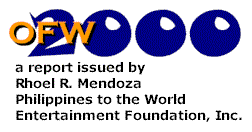|
The
Newsletter |
|
| Remembering Malcolm X Overseas The Abuja Islamic
Education Trust
|
OFW 2000: OBJECTIVES FOR THE YEAR 2000 & BEYOND (The Fight Is Not Yet Over) Whether or not 2000 is declared as The Year of Overseas Filipino Workers, we have resolved to act on our own - as we always do for as long as it benefits the modern-day heroes - and, hopefully, with help again from like-minded kababayans in order to make OFWs seen and heard more, especially back home, and thereby reawaken our kababayans to the reality of OFWs. Among the things that PWEFI intends to pursue this year are: 1. Push for the passing of the absentee voting bill so that we can start exercising our right of suffrage, hopefully, in the 2001 elections. 2. Urge the government to establish a one-stop office or agency (under the appropriate department) for OFWs wishing to go into business – an agency that would assist them from preparing feasibility studies to securing loans to actual start-up. 3. Urge OWWA to launch an extensive information campaign so that OFWs are really aware of their benefits. 4. Suggest to the Department of Education a nationwide information campaign that would educate the youth about the pros and cons of labor migration, the contributions of OFWs to the Philippine economy, the effects of labor migration on the Filipino family, etc. (or better still, suggest the incorporation of such within the appropriate school subject.) Moreover, the Foundation submitted to the office of Sen. Legarda in July last year several other suggestions. During a meeting between Sen. Legarda's legislative staff and DFA Undersecretary Benjamin Domingo (who is in charge of OFW Affairs), this list was, in turn, given to the latter who was reportedly excited over the declaration of OFW Year and was very receptive to our suggestions which included the following: * Philippine embassies and consulates must be required to have 24-hour hotlines which OFWs could call when they get into trouble. This way, even those who are jailed for very minor offenses are immediately attended to. * OFWs must be urged to inform the embassy immediately whenever they hear about kababayans being arrested and jailed so that appropriate action could be taken immediately. * Our diplomatic missions should seek the assistance of community organizations which would be willing to act as monitoring groups for domestic helpers (DHs). These groups must be given authority by the Embassy to call on a regular basis employers of Filipina housemaids and to speak with the housemaids themselves in order to find out if all is well with them. Contracts of employment should then have a provision stipulating this arrangement. This special focus on domestic helpers stems from the fact that among the different sectors of OFW communities, these women are the most vulnerable to abuse. Aside from that, once they arrive in the Kingdom (or any other country for that matter) and the moment they enter their employers' home, they are, in a manner of speaking, kept under lock and key and they virtually lose touch with the "outside world." No one, therefore, knows what happens to them inside. Just imagine if they are your mothers or sisters. Would you be able to sleep knowing that their situation makes them prone to abuse or maltreatment? [Note: Sometime in October 1999, the embassy announced the establishment of ACPs (Accredited Community Partners). This was reported in Riyadh Daily (Oct. 18) and Saudi Gazette (Oct. 25). The ACP concept is strikingly similar to that of PWEFI's suggested DH monitoring groups. An offshoot perhaps? It is worth mentioning at this point that based on PWEFI's ideas and suggestions for OFW Year, Sen. Legarda's legislative staff sent a written report to the office of Usec. Domingo. The possibility, therefore, of that report being circulated to the various Philippine diplomatic missions worldwide - especially in countries with huge OFW population - is not far-fetched. After all, Usec. Domingo is in charge of OFW Affairs at the DFA. In fact, a PWEFI member in Jeddah who spoke with an official at the Consulate did mention the fact that last year they received a DFA communique about the campaign for OFW Year.] * Ambassadors and consuls must hold once-a-week (or even once-a-month) dialogues with their respective OFW communities encouraging the ordinary OFWs (and not only "community leaders" and "prominent members of the community") to attend. This is the sector of the community that is "heard and seen" less often. The embassy should attend more to, and encourage more participation from, this under-represented sector. * Recruitment and placement agencies must be mandated to post at least one representative in critical OFW destinations to look after their deployed workers. [Note: Also in October last year, it was reported (Arab News, Oct. 20) that the POEA was planning to require job recruiters to put up offices in places where they deploy workers in order to minimize the incidence of welfare cases. A direct offshoot of PWEFI's suggestion?] [next]
|
Copyright © 1999 - 2000 |


